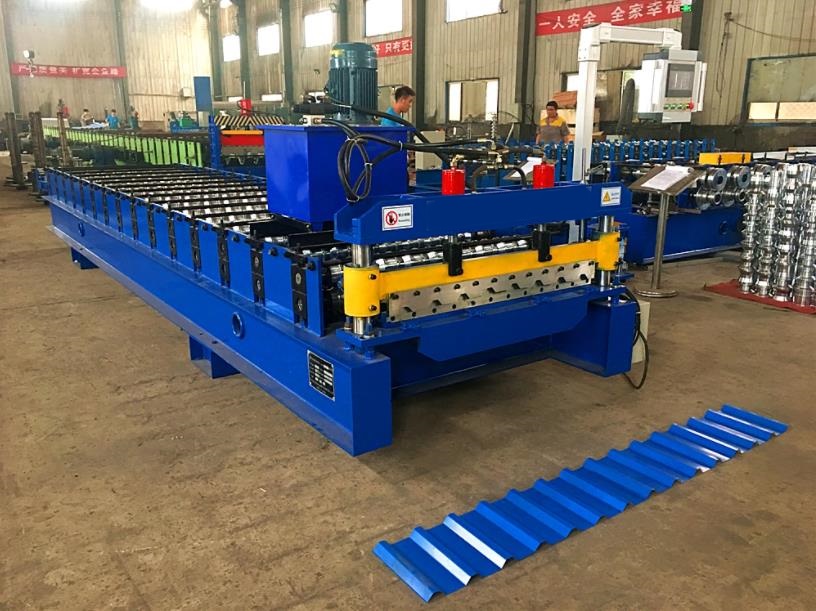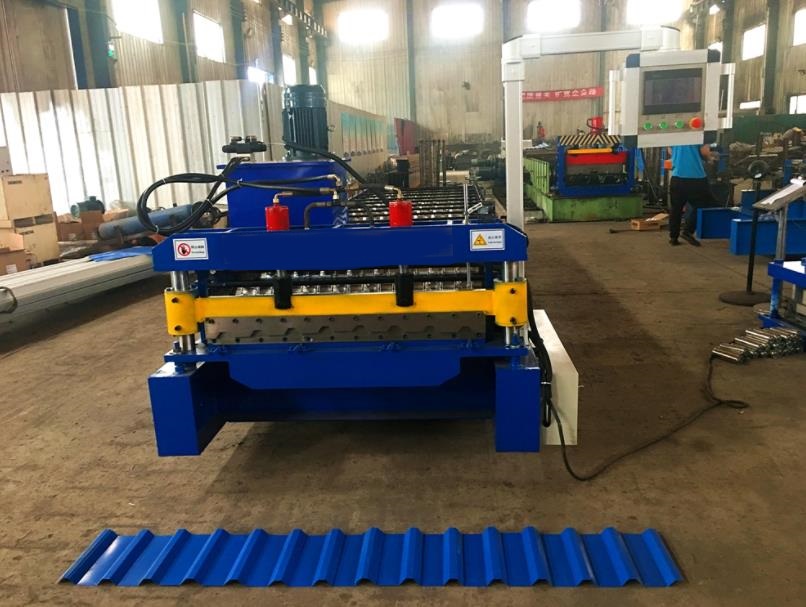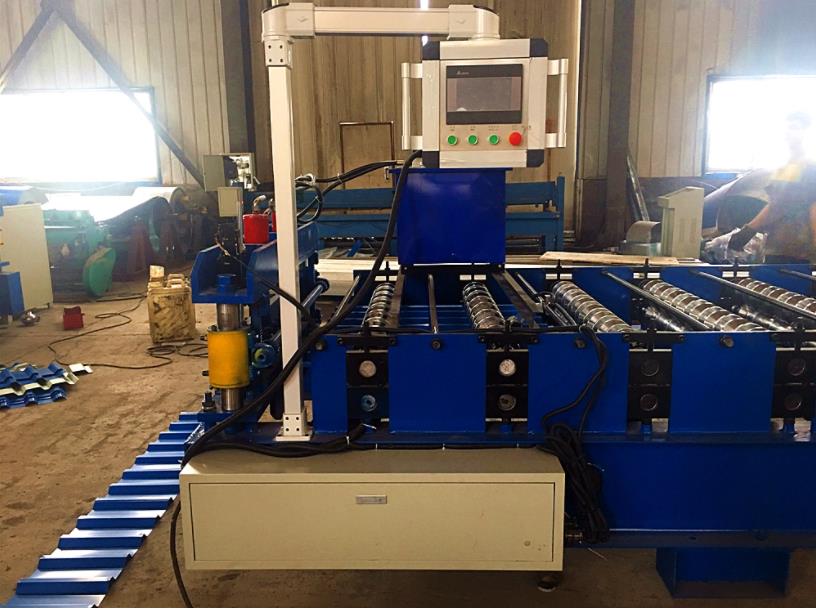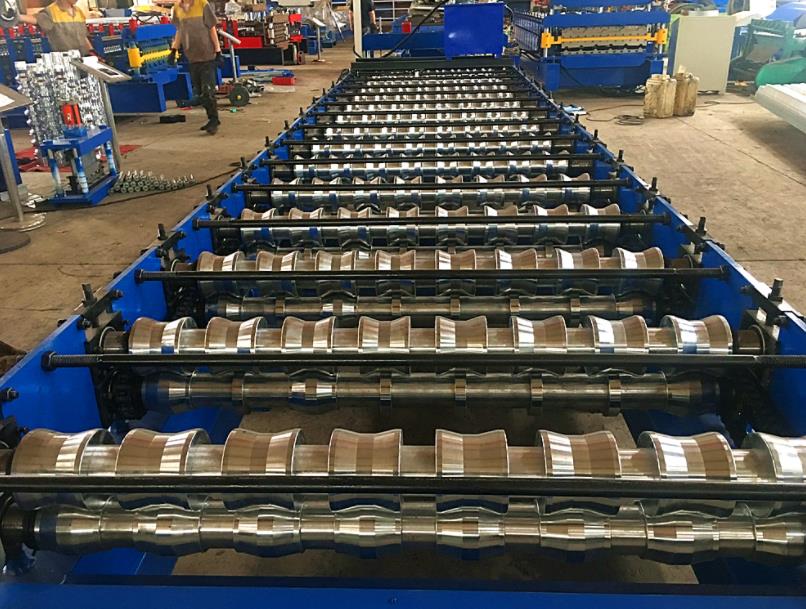Chile PV8 Roof Panel Machine PT825 - Reliable & Fast Forming
Unveiling the Precision of Chile PV8 Roof Panel Forming Technology
In the rapidly evolving landscape of modern construction, the demand for efficient, durable, and cost-effective roofing solutions has never been higher. Industrial and commercial sectors, in particular, require robust building materials capable of withstanding diverse environmental conditions while maintaining structural integrity over extended periods. This global trend places immense pressure on manufacturers to deliver innovative machinery that transforms raw materials into high-performance construction components. Central to this transformation is the advanced cold roll forming technology, which has revolutionized the production of metal roof panels. Among the leading innovations in this domain is the Chile PV8 Roof Panel forming machine pt825 panel, a specialized piece of equipment engineered to meet the stringent demands of contemporary building projects. This machine exemplifies the convergence of mechanical engineering prowess, intelligent control systems, and material science to produce roofing panels known for their strength, aesthetic appeal, and longevity. The PV8 profile, with its unique design, offers superior water drainage, enhanced load-bearing capacity, and a sleek appearance, making it a preferred choice for various architectural applications across different climatic zones. Understanding the intricate workings and benefits of this specific machinery is crucial for stakeholders seeking to optimize their production capabilities and deliver premium roofing solutions to their clients in an increasingly competitive market.

The increasing adoption of pre-engineered building systems and the drive towards sustainable construction practices further underscore the importance of precision roll forming machinery. Countries with burgeoning construction sectors, such as Chile, are particularly keen on integrating advanced manufacturing technologies to support large-scale infrastructure and residential development. The strategic design of the Chile PV8 Roof Panel forming machine pt825 panel caters precisely to these regional and global requirements, ensuring that high-quality, standardized, and custom-length panels can be produced on-site or in manufacturing facilities with remarkable efficiency. This capability not only reduces transportation costs and material waste but also significantly accelerates project timelines, offering a distinct competitive advantage. The machine's robust construction and sophisticated control systems are designed to process various types of coated steel, including pre-painted galvanized iron (PPGI), galvanized steel (GI), and Aluzinc, accommodating a range of thicknesses to suit diverse structural needs and environmental exposures. Its operational reliability and consistency in output contribute directly to the overall quality and safety of the final building structure, aligning with international building codes and performance standards. This integration of high-performance materials with state-of-the-art manufacturing processes ensures that the resulting PV8 panels are not only aesthetically pleasing but also exceptionally durable and resistant to the elements.
The Advanced Manufacturing Process of PV8 Roof Panels
The production of PV8 roof panels using the Chile PV8 Roof Panel forming machine pt825 panel is a sophisticated multi-stage cold roll forming process, meticulously engineered to achieve unparalleled precision and consistent quality. This process begins with the uncoiling of the raw material, typically high-grade steel coils, which are loaded onto an automatic or manual decoiler. The steel, often pre-painted, galvanized, or Aluzinc-coated, undergoes an initial leveling phase to ensure it is perfectly flat before entering the forming section. This crucial step prevents material distortions that could compromise the final panel's integrity and aesthetic. Following leveling, the flat strip advances through a series of precision-engineered roller stations. Each station, equipped with meticulously CNC-machined rollers, progressively shapes the metal into the distinctive PV8 profile. The design of these rollers is paramount; they are typically crafted from high-grade tool steel, such as Cr12MoV, and are precisely ground and polished to minimize friction and ensure a smooth, uniform profile without stress concentrations or surface damage. The forming process itself involves gradual bending and shaping, ensuring that the material's structural properties, like its yield strength (typically 250-550 MPa for roofing steel), are maintained, and internal stresses are minimized. This meticulous approach ensures that the panels retain their strength and anti-corrosion properties throughout their service life, which often exceeds 30 years under proper installation and maintenance.

After the material has been fully profiled, it moves to the cutting station, where a hydraulic cutting device, precisely controlled by the machine's PLC system, shears the panel to the desired length. The cutting process is designed to be burr-free, ensuring clean edges that facilitate easy installation and prevent corrosion initiation points. Post-cutting, the finished PV8 panels are typically discharged onto a run-out table or automatic stacker for collection and packaging. Quality control is integrated throughout the entire manufacturing flow. In-line sensors monitor critical parameters such as material thickness, profile dimensions, and length accuracy, ensuring that each panel conforms to strict international standards such as ISO 9001 for quality management and relevant ASTM or EN standards for steel properties and roofing profiles. Regular calibration of the machine's components, including the rollers and cutting die, is also essential for maintaining production consistency and precision. The Chile PV8 Roof Panel forming machine pt825 panel is particularly suited for industries requiring large volumes of consistent, high-quality roofing, including commercial construction (warehouses, factories), agricultural buildings (barns, sheds), and public infrastructure (schools, community centers). The resulting PV8 panels exhibit excellent energy efficiency due to their compatibility with insulation layers and their ability to reflect solar radiation when coated with specific finishes. Furthermore, the inherent design of the PV8 profile, combined with the protective coatings of the raw material, provides superior resistance to corrosion, vital for longevity in humid or corrosive environments.
Technical Specifications and Performance Benchmarks
The performance of the Chile PV8 Roof Panel forming machine pt825 panel is defined by a robust set of technical specifications designed for high-volume, precision manufacturing. Understanding these parameters is crucial for project managers, engineers, and procurement specialists to assess its suitability for specific applications.
| Parameter | Specification |
|---|---|
| Material Thickness Range | 0.3 mm - 0.8 mm (Galvanized, PPGI, Aluzinc steel) |
| Feeding Coil Width | 1000 mm - 1250 mm |
| Effective Panel Width (PV8) | 825 mm |
| Roll Forming Speed | 8-15 meters/minute (adjustable) |
| Number of Forming Stations | 15-18 stations (optimised for PV8 profile) |
| Roller Material | High-grade GCr15 or Cr12MoV quenched steel, hard chrome plated |
| Cutting System | Hydraulic cutting, post-forming shear |
| Control System | PLC Control with Touch Screen HMI (e.g., Siemens, Panasonic) |
| Main Motor Power | 5.5 kW - 7.5 kW (depending on configuration) |
| Machine Weight | Approx. 6.0 - 8.0 tons |
| Dimensions (L x W x H) | Approx. 7.5m x 1.5m x 1.6m (excluding decoiler/stacker) |
These specifications highlight the machine's capability to process a wide range of common roofing materials, ensuring versatility for various project requirements. The robust motor power and carefully selected roller materials guarantee continuous, high-speed operation with minimal wear, translating into a longer service life and reduced maintenance costs. The integration of advanced PLC control systems, often from reputable brands like Siemens or Panasonic, provides operators with intuitive control over production parameters, including panel length, batch quantity, and production speed, ensuring precision to within ±2mm for panel length. This level of accuracy is critical for seamless installation and structural integrity of the final roof. The automated hydraulic cutting system ensures clean, precise cuts without deforming the panel profile, a common challenge with less advanced machinery. Furthermore, the compact yet sturdy design of the Chile PV8 Roof Panel forming machine pt825 panel allows for flexible installation in various factory layouts, optimizing space utilization.

The choice of specific components, such as the hydraulic pump station and electrical components, adheres to international standards, contributing to the machine's overall reliability and ease of global sourcing for spare parts. The machine’s electrical system, designed to operate on common industrial voltages (e.g., 380V, 50Hz, 3-phase), ensures compatibility with existing infrastructure in most manufacturing environments. Beyond raw specifications, the Chile PV8 Roof Panel forming machine pt825 panel is engineered for energy efficiency, minimizing power consumption during operation through optimized motor sizing and hydraulic system design. This focus on operational cost reduction makes it an economically sound investment for manufacturers looking to enhance their production efficiency while reducing their carbon footprint. The cumulative effect of these meticulously designed technical attributes is a machine that not only meets but often exceeds the performance expectations for modern roof panel production, delivering a rapid return on investment through superior output quality and operational longevity.
Application Scenarios and Strategic Advantages
The versatility and robust output of the Chile PV8 Roof Panel forming machine pt825 panel make it indispensable across a multitude of application scenarios within the construction sector. Primarily, it excels in producing roofing for large-span industrial buildings such as warehouses, manufacturing plants, and logistics centers where wide coverage and structural integrity are paramount. The PV8 profile's design, characterized by prominent ribs and wide valleys, ensures excellent water shedding capabilities, preventing ponding and associated structural stress. This characteristic is particularly vital in regions experiencing heavy rainfall or snow. Furthermore, the aesthetic appeal of the PV8 profile, with its clean lines, makes it suitable for commercial complexes, shopping malls, and institutional buildings, offering both functional superiority and modern design integration. Agricultural sectors also benefit significantly from this technology, utilizing the panels for barns, sheds, and livestock shelters, where durability against weather elements and ease of installation are key considerations. The machine's capability to produce custom lengths on-site dramatically reduces material waste and transportation costs, enhancing project efficiency for remote or large-scale constructions.

Beyond direct application, the strategic advantages of investing in the Chile PV8 Roof Panel forming machine pt825 panel extend to the operational and financial health of the manufacturing enterprise. By producing panels in-house, companies gain greater control over product quality, lead times, and inventory management. This reduces reliance on third-party suppliers, mitigating supply chain risks and fostering greater operational autonomy. The high production speed and automated operation minimize labor requirements, translating into significant long-term cost savings. Moreover, the consistency and precision of the formed panels reduce installation time on construction sites, leading to faster project completion and improved labor efficiency for building contractors. The machine's adherence to international standards and use of high-quality components ensure minimal downtime, supported by comprehensive warranty and readily available customer support for technical queries and spare parts. This robust support infrastructure further solidifies trustworthiness, offering peace of mind to operators and investors alike. For businesses aiming to expand their product portfolio or enter new markets, offering custom PV8 panel solutions provides a distinct competitive edge, allowing them to cater to bespoke architectural designs and challenging project specifications with confidence and superior quality.
Tailored Solutions and Client Success Stories
Recognizing that every client possesses unique operational requirements and market demands, leading manufacturers of the Chile PV8 Roof Panel forming machine pt825 panel offer comprehensive customization options and integrated solutions. This bespoke approach ensures that the machinery perfectly aligns with specific production volumes, material types, and spatial constraints. Customization can involve adjustments to the machine's speed, modifications for different material thicknesses, or the integration of advanced features such as automatic stacking systems, online embossing capabilities, or specialized safety protocols to meet rigorous regional regulations. For example, a client requiring extremely high production rates might opt for a machine with enhanced motor power and a dual-line setup, while another might prioritize a compact design for a factory with limited floor space. These tailored solutions are developed through close collaboration between the client's engineering team and the manufacturer's R&D department, leveraging extensive industry experience and technical expertise to deliver optimized performance. This client-centric approach not only builds stronger relationships but also positions the manufacturer as a trusted partner in long-term operational success, providing authoritative guidance throughout the selection, installation, and operational phases.
A testament to the machine's reliability and performance can be seen in numerous successful deployments globally. For instance, a major construction firm in Latin America recently acquired a customized Chile PV8 Roof Panel forming machine pt825 panel to support its ambitious pipeline of industrial park developments. Prior to this acquisition, the firm faced challenges with inconsistent panel quality and protracted delivery times from external suppliers. Post-installation, the firm reported a 30% reduction in roofing material costs, a 25% increase in project completion speed due to on-demand panel production, and a noticeable improvement in overall roof quality, resulting in fewer post-installation defects. Customer feedback consistently highlights the machine's intuitive PLC interface, minimal maintenance requirements, and the exceptional durability of the rollers, which contribute to extended periods of uninterrupted operation. Another case involved a smaller contractor who benefited immensely from the machine's ability to produce varying panel lengths without complex retooling, allowing them to serve a wider range of projects from residential developments to small commercial units. These real-world experiences underscore the practical advantages and significant return on investment offered by this advanced roll forming technology, reinforcing its trustworthiness in the global B2B market.
Frequently Asked Questions (FAQ)
- Q1: What is the typical lead time for delivering a Chile PV8 Roof Panel forming machine pt825 panel?
- A1: Standard models typically have a lead time of 45-60 working days from order confirmation, depending on the current production schedule. Customized machines may require additional time for design and fabrication, usually extending the lead time by 15-30 days. We strive to provide transparent and accurate delivery schedules at the time of quotation.
- Q2: What kind of warranty and after-sales support is provided?
- A2: Our machines typically come with a 12-month warranty covering mechanical and electrical components from the date of installation or commissioning. We provide comprehensive after-sales support, including remote technical assistance, online troubleshooting, and on-site engineer visits for complex issues, ensuring minimal downtime and sustained operational efficiency. Spare parts are readily available and can be shipped globally.
- Q3: Can the Chile PV8 Roof Panel forming machine pt825 panel produce other profiles?
- A3: The standard Chile PV8 Roof Panel forming machine pt825 panel is specifically engineered for the PV8 profile to ensure optimal precision and efficiency for this specific design. While some machines may be designed with interchangeable cassettes for different profiles, this usually requires a separate quotation for the additional tooling. For multi-profile requirements, we can discuss modular solutions or dedicated lines during the consultation phase to meet your diverse production needs.
- Q4: What are the power requirements for operating this machine?
- A4: The machine typically requires a 3-phase power supply, commonly 380V or 415V at 50Hz, with a total installed power of approximately 7.5 kW to 11 kW, depending on the specific configuration and included auxiliary equipment. Detailed electrical specifications will be provided in the technical documentation for proper installation planning.
- Q5: What are the space requirements for installing the machine?
- A5: A typical setup for the Chile PV8 Roof Panel forming machine pt825 panel including the decoiler, main machine, and run-out table, requires a minimum floor space of approximately 15-20 meters in length and 3-4 meters in width. Adequate space around the machine for material handling, maintenance access, and safety clearances should also be considered. Detailed layout drawings will be provided for your factory planning.
References
- Smith, J. (2018). Cold Roll Forming: Technology and Applications. CRC Press.
- International Organization for Standardization. ISO 9001:2015 - Quality management systems — Requirements.
- American Society for Testing and Materials. ASTM A653/A653M - Standard Specification for Steel Sheet, Zinc-Coated (Galvanized) or Zinc-Iron Alloy-Coated (Galvannealed) by the Hot-Dip Process.
- European Committee for Standardization. EN 10346:2015 - Continuously hot-dip coated steel flat products for cold forming — Technical delivery conditions.
- Manufacturing Engineering Society. Advances in Metal Forming Processes: A Review of Modern Techniques. (Various Publications).
-
Corrugated iron roofing sheet making machine with CE, AutoNewsNov.17, 2025
-
3mm Steel C U Channel Roll Forming Machine, Heavy DutyNewsNov.17, 2025
-
Calamima Micro Ondulada corrugated roof sheet machine - CNCNewsNov.17, 2025
-
Metal Roofing Roll Former for Sale Companies - Fast, PreciseNewsNov.17, 2025
-
Drywall Steel L Angle Bar forming machine | Fast, PreciseNewsNov.17, 2025
-
Corrugated Iron Roofing Sheet Making Machine, Fast & DurableNewsNov.11, 2025
-
Corrugated Metal Roofing Machine | High-Speed, Precise, CENewsNov.11, 2025







